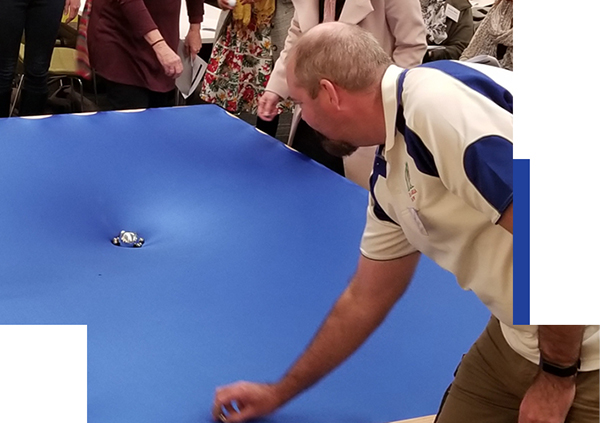UWA PLUS
Einsteinian Science for School Teachers III: From Climate to Cosmology - PHYSM413
This micro-credential primarily covers content related to Year 10 curriculum, synthesising everything that is covered across micro-credentials: Einsteinian Science for School Teachers I: Atoms, Light, Space and Climate (PHYSM411) and Einsteinian Science for School Teachers II: Gravity, Energy and Quantum Mechanics (PHYSM412).
The participants will develop an in-depth understanding of the physical mechanisms which are fundamental to the Earth's climate and learn about the history of the Earth's climate and how planets form and evolve in the universe.
You will then learn about how this relates to our understanding of the evolution of the universe, from the first instants of the Big Bang and the initial formation of the constituents of matter, all the way to the ongoing expansion of the universe due to dark energy.
This micro-credential course was developed with the support of the Australian Government’s Micro-credentials Pilot in Higher Education.
Upon successful completion, you'll receive:
- Three (3) PD Points
- A Certificate of Achievement
- A UWA Plus Professional Development Transcript, listing all successfully completed micro-credentials
- Delivery mode
- This micro-credential will be delivered online, with pre-recorded lectures and scheduled online tutorials and workshops.
- Course dates
- Registrations
- 1. Registrations will close on 16 February 2026 [MC-1H]
2. Registrations will close on 13 July 2026 [MC-3Q] - Duration
- 6 weeks
- Effort
- 75 hours
- Academic lead
- Professor Li Ju
- Cost
- $600 incl. GST
- Critical information summary
- PHYSM413 - Critical information summary (PDF, 245KB)
23 February 2026 - 11 April 2026 [MC-1H]
20 July 2026 - 05 September 2026 [MC-3Q]

Registrations are open
What you'll learn
Explain the physical mechanisms which are fundamental to the Earth's climate at an in-depth level
Explain the evolution of the universe, from the Big Bang to the ongoing expansion of the universe due to dark energy
Teach the key topics in modern physics at the appropriate school level using simple models and analogies
Identify and evaluate the key features to be included in an Integrated Knowledge Base for both existing and future TSFs

Why study this course?
- Gain a broad understanding of the beautiful revelations of modern science
- Learn to teach this understanding through a series of in-class activities designed to reveal Einsteinian concepts
- Become equipped with the knowledge and skills needed to adopt Einsteinian physics lesson plans, or create your own lesson plans for your own classes.
Who should study this course?
This micro-credential is ideal for all primary school teachers and secondary school science and technology teachers and other educators.
Recommended prior knowledge:
A teaching qualification. No further prior study is required but for those wanting a head-start, we recommend the books and research papers listed on www.einsteinianphysics.com
This micro-credential will consist of online lectures, live tutorials, and training videos. The course will also incorporate fortnightly two-hour interactive online workshop sessions with demonstrators running through the activities live with active audience participation. This course will require a weekly commitment of 3-5 hours per week. All sessions will be recorded if you cannot attend live.
What's next after this course?
This 3 point micro-credential can contribute to future study credit for a Physics Major as part of a Bachelor of Science.
This unit will provide opportunities for school science teachers to upskill to higher level science teaching.

